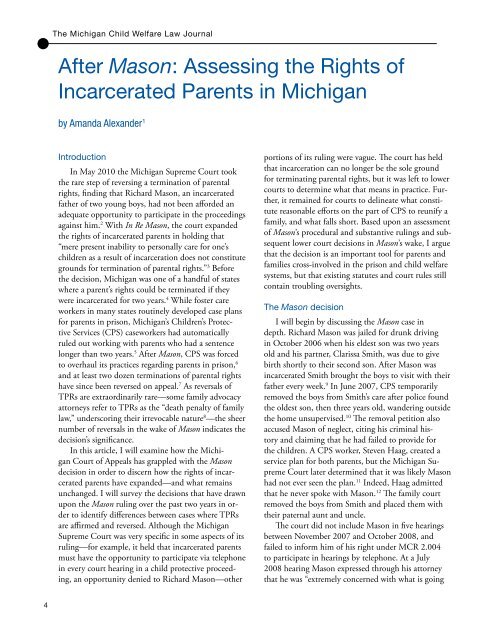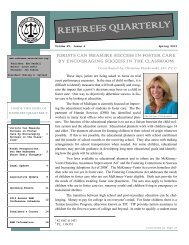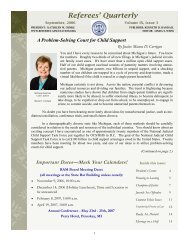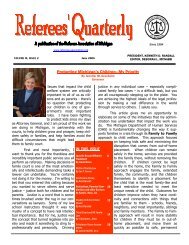The Michigan Child Welfare Law Journal - Referees Association of ...
The Michigan Child Welfare Law Journal - Referees Association of ...
The Michigan Child Welfare Law Journal - Referees Association of ...
You also want an ePaper? Increase the reach of your titles
YUMPU automatically turns print PDFs into web optimized ePapers that Google loves.
•<br />
<strong>The</strong> <strong>Michigan</strong> <strong>Child</strong> <strong>Welfare</strong> <strong>Law</strong> <strong>Journal</strong><br />
After Mason: Assessing the Rights <strong>of</strong><br />
Incarcerated Parents in <strong>Michigan</strong><br />
by Amanda Alexander 1<br />
Introduction<br />
In May 2010 the <strong>Michigan</strong> Supreme Court took<br />
the rare step <strong>of</strong> reversing a termination <strong>of</strong> parental<br />
rights, finding that Richard Mason, an incarcerated<br />
father <strong>of</strong> two young boys, had not been afforded an<br />
adequate opportunity to participate in the proceedings<br />
against him. 2 With In Re Mason, the court expanded<br />
the rights <strong>of</strong> incarcerated parents in holding that<br />
“mere present inability to personally care for one’s<br />
children as a result <strong>of</strong> incarceration does not constitute<br />
grounds for termination <strong>of</strong> parental rights.” 3 Before<br />
the decision, <strong>Michigan</strong> was one <strong>of</strong> a handful <strong>of</strong> states<br />
where a parent’s rights could be terminated if they<br />
were incarcerated for two years. 4 While foster care<br />
workers in many states routinely developed case plans<br />
for parents in prison, <strong>Michigan</strong>’s <strong>Child</strong>ren’s Protective<br />
Services (CPS) caseworkers had automatically<br />
ruled out working with parents who had a sentence<br />
longer than two years. 5 After Mason, CPS was forced<br />
to overhaul its practices regarding parents in prison, 6<br />
and at least two dozen terminations <strong>of</strong> parental rights<br />
have since been reversed on appeal. 7 As reversals <strong>of</strong><br />
TPRs are extraordinarily rare—some family advocacy<br />
attorneys refer to TPRs as the “death penalty <strong>of</strong> family<br />
law,” underscoring their irrevocable nature 8 —the sheer<br />
number <strong>of</strong> reversals in the wake <strong>of</strong> Mason indicates the<br />
decision’s significance.<br />
In this article, I will examine how the <strong>Michigan</strong><br />
Court <strong>of</strong> Appeals has grappled with the Mason<br />
decision in order to discern how the rights <strong>of</strong> incarcerated<br />
parents have expanded—and what remains<br />
unchanged. I will survey the decisions that have drawn<br />
upon the Mason ruling over the past two years in order<br />
to identify differences between cases where TPRs<br />
are affirmed and reversed. Although the <strong>Michigan</strong><br />
Supreme Court was very specific in some aspects <strong>of</strong> its<br />
ruling—for example, it held that incarcerated parents<br />
must have the opportunity to participate via telephone<br />
in every court hearing in a child protective proceeding,<br />
an opportunity denied to Richard Mason—other<br />
portions <strong>of</strong> its ruling were vague. <strong>The</strong> court has held<br />
that incarceration can no longer be the sole ground<br />
for terminating parental rights, but it was left to lower<br />
courts to determine what that means in practice. Further,<br />
it remained for courts to delineate what constitute<br />
reasonable efforts on the part <strong>of</strong> CPS to reunify a<br />
family, and what falls short. Based upon an assessment<br />
<strong>of</strong> Mason’s procedural and substantive rulings and subsequent<br />
lower court decisions in Mason’s wake, I argue<br />
that the decision is an important tool for parents and<br />
families cross-involved in the prison and child welfare<br />
systems, but that existing statutes and court rules still<br />
contain troubling oversights.<br />
<strong>The</strong> Mason decision<br />
I will begin by discussing the Mason case in<br />
depth. Richard Mason was jailed for drunk driving<br />
in October 2006 when his eldest son was two years<br />
old and his partner, Clarissa Smith, was due to give<br />
birth shortly to their second son. After Mason was<br />
incarcerated Smith brought the boys to visit with their<br />
father every week. 9 In June 2007, CPS temporarily<br />
removed the boys from Smith’s care after police found<br />
the oldest son, then three years old, wandering outside<br />
the home unsupervised. 10 <strong>The</strong> removal petition also<br />
accused Mason <strong>of</strong> neglect, citing his criminal history<br />
and claiming that he had failed to provide for<br />
the children. A CPS worker, Steven Haag, created a<br />
service plan for both parents, but the <strong>Michigan</strong> Supreme<br />
Court later determined that it was likely Mason<br />
had not ever seen the plan. 11 Indeed, Haag admitted<br />
that he never spoke with Mason. 12 <strong>The</strong> family court<br />
removed the boys from Smith and placed them with<br />
their paternal aunt and uncle.<br />
<strong>The</strong> court did not include Mason in five hearings<br />
between November 2007 and October 2008, and<br />
failed to inform him <strong>of</strong> his right under MCR 2.004<br />
to participate in hearings by telephone. At a July<br />
2008 hearing Mason expressed through his attorney<br />
that he was “extremely concerned with what is going<br />
4







